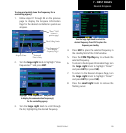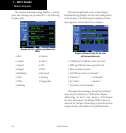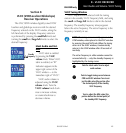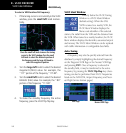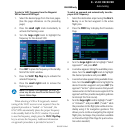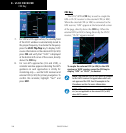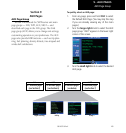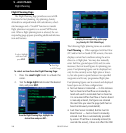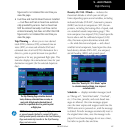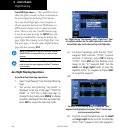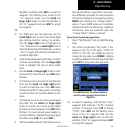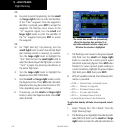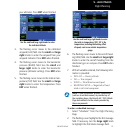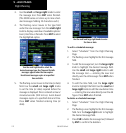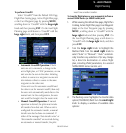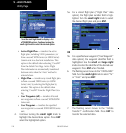
9 - AUX PAGES
167
190-00357-00 Rev E
Flight Planning
figure and is not retained the next time you
view the page.
• Fuel Flow and Fuel On Board Sensors Installed
— Fuel flow and fuel on board are automati-
cally provided by sensors. Fuel on board can
NOT be entered manually. Fuel Flow can be
entered manually, but does not affect the FOB
figure and is not retained the next time you
view the page.
Trip Planning — allows you to view desired
track(DTK),distance(DIS),estimatedtimeen
route (ETE), en route safe altitude (ESA) and
estimated time of arrival (ETA) information for a
direct-to, point-to-point between two specified
waypoints or for any programmed flight plan. This
item also displays the sunrise/sunset times for your
destination waypoint (for the selected departure
date).
The Trip Planning Page calculates desired
track, distance, estimated time en route, en
route safe altitude and estimated time of
arrival for a specified direct-to, point-to-point
or flight plan.
NOTE: Point-to-point waypoints, flight plans and/
or ground speeds (default is current GPS-calcu-
lated ground speed) entered on the Fuel Planning
Page automatically transfer to the Trip Planning
Page, and vice versa.
Density Alt / TAS / Winds — indicates the
theoretical altitude at which your aircraft per-
forms depending upon several variables, including
indicatedaltitude(INDALT), barometric pressure
(BARO) and total air temperature (TAT; the tem-
perature, including the heating effect of speed, read
on a standard outside temperature gauge). This
item computes true airspeed (TAS), based upon the
factors above and the calibrated airspeed (CAS).
Also, this menu option determines winds aloft
— the wind direction and speed — and a head
wind/tail wind component, based upon the calcu-
lateddensityaltitude(DENALT),trueairspeed,
aircraftheading(HDG)andgroundspeed.
Select the “Density Alt / TAS / Winds” option
to calculate density altitude, true airspeed
and winds aloft.
Scheduler — displays reminder messages (such
as “Change oil”, “Switch fuel tanks”, “Overhaul”,
etc.). One-time, periodic, and event-based mes-
sages are allowed. One-time messages appear
once the timer expires and reappear each time the
500W-series unit is powered on, until the message
is deleted. Periodic messages automatically reset to
the original timer value, once the message is dis-
played. Event-based messages do not use a timer,
but rather a specific date and time.



